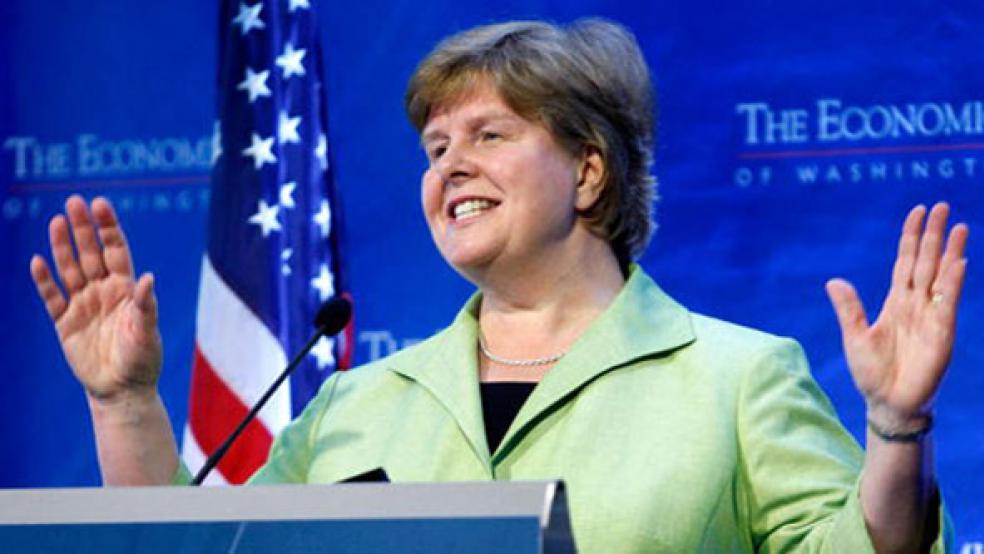In a farewell speech just two days before she steps down as a top economic adviser to President Obama, Christina Romer pleaded on Wednesday for a substantial new round of government spending and tax cuts to revive the stalling recovery.
“Concern about the deficit cannot be an excuse for leaving unemployed workers to suffer,’’ Romer, head of the White House Council of Economic Advisers, said in a speech at the National Press Club. “We have the tools that would bring down unemployment without worsening our long-run fiscal outlook, if we can only find the will and the wisdom to use them.”
Romer staunchly defended the president’s original $814 billion stimulus program, though she admitted that she had been wrong in predicting early last year that the program would keep unemployment from rising above 8 percent. Instead, the jobless rate soared to almost 10 percent and remains stuck at 9.5 percent.
“We, like virtually every other forecaster, failed to anticipate just how violent the recession would be in the absence of policy,’’ Romer admitted. But she said the stimulus measures had in fact delivered on their promise and prevented the recession from being even worse than it was.
Citing reports by the Congressional Budget Office and by private forecasters, she said the stimulus program of government spending and tax breaks had nonetheless boosted growth and prevented the loss of as many as 3 million additional jobs.
But that message will get no sympathy from Republicans in Congress, who have insisted for months that the stimulus bill was a failure and bitterly opposed recent Democratic bills to extend unemployment benefits and provide money to prevent teacher layoffs.
Republican leaders have repeatedly heaped scorn on Romer’s 8 percent unemployment rate prediction from January 2009. The economy has lost more than 8 million jobs since the recession began in December 2007.
Sounding cheerful, Romer said it had been an “honor’’ to work in the Obama White House. Romer has said she wanted to return to her teaching post at the University of California at Berkeley, mainly for family reasons, though she is widely rumored to be a candidate for president of the Federal Reserve Bank of San Francisco. There has also been speculation that Romer was frustrated, in part because she had wanted the White House to propose an even bigger economic stimulus package.
Peter R. Orszag, who stepped down last month as the White House budget director, said just before he left office that the administration had gotten as much money out of Congress as it possibly could have, given the flat-out opposition from Republicans and as well as deficit anxiety among some conservative Democrats. Economic activity has slowed to a crawl in recent months. Last week, the government revised its estimate of growth in the second quarter to 1.6 percent from 2.4 percent. Housing sales have fallen sharply as the government’s $8,000 homebuyer tax credit expired this spring. And private sector job growth slipped to 71,000 jobs in July, far below what is necessary to keep pace with increases in the workforce. On Friday, many analysts expect the Labor Department to report that job growth in August was even weaker – perhaps as low as 40,000 new jobs.
Romer’s language was in some ways more urgent than that of President Obama, who said on Monday that his economic advisers were preparing a new list of proposals to ramp up economic demand. Though Romer said chances of a double-dip recession are “very small,’’ she made it clear that the economy is flagging and that the first round of stimulus money will not be enough.
“The thing I do regret is that there is still so much unfinished business,’’ she said. “That the economy remains as troubled as it is despite aggressive action reflects the fact that this has not been a normal recession. Just as the downturn was uncharted territory, so is the recovery.”
Romer said that low-cost measures like export incentives could provide a boost, but she said the real need was to revive the overall volume of economic activity through more spending and additional tax breaks.
“The only surefire ways for policymakers to substantially increase aggregate demand in the short run are for the government to spend more and tax less,” she said. “In my view, we should be moving forward on both fronts.”
Romer offered little in the way of new specifics beyond what President Obama said his economic team is now weighing – tax breaks for lower-and middle-income families, additional infrastructure spending and new tax incentives to spur investments.
White House officials have said they hope to unveil those proposals around the time Congress comes back into session later this month.





